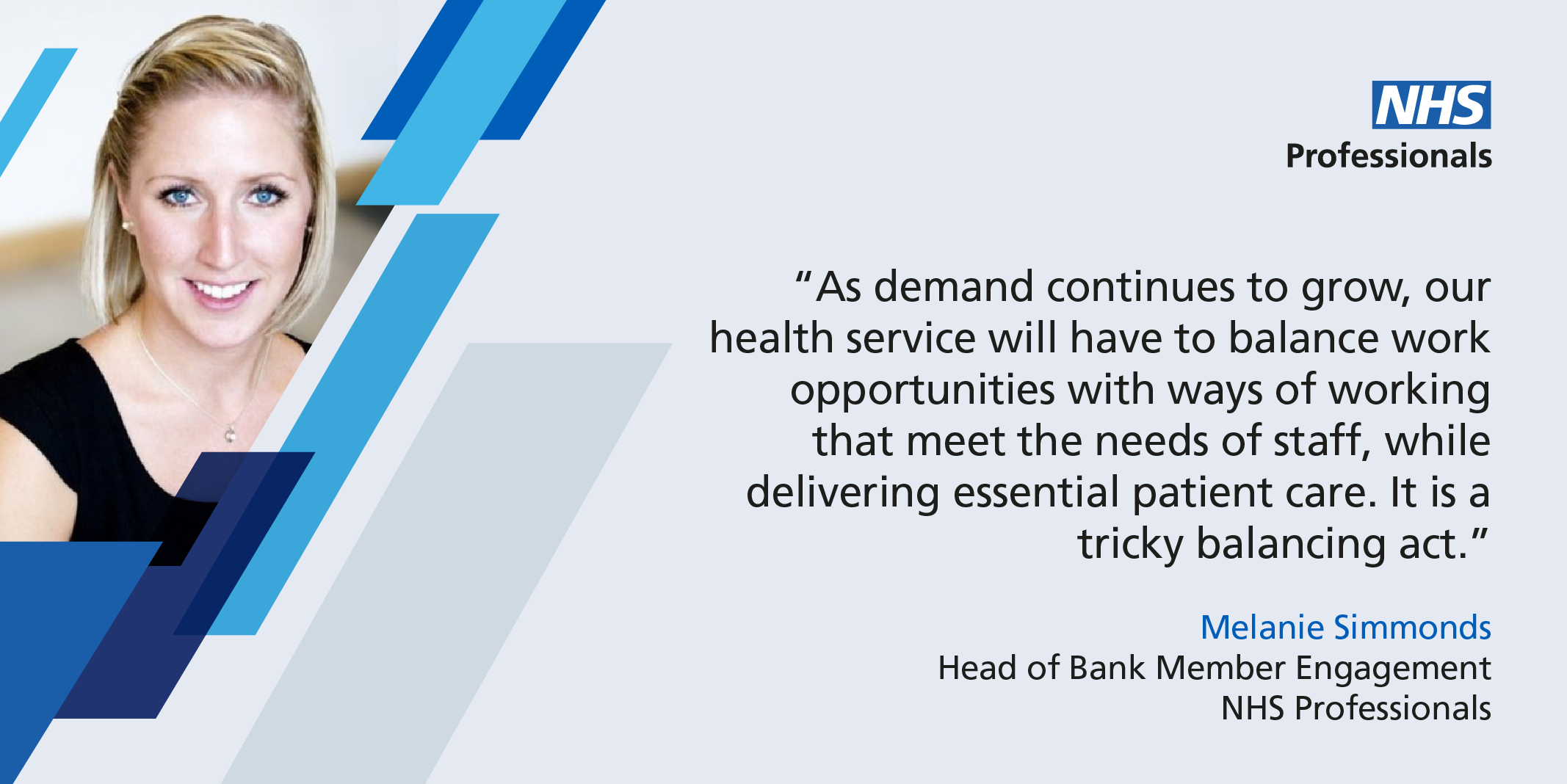Now is the time for flexible workers

As a workforce on the frontline against Covid-19, the NHS has been recognised country-wide, from weekly clapping to colourful window posters of thanks. What’s less visible, and not often recognised, is the tireless contribution made to the health service by flexible workers.
While the words agile and flexible are new to many organisations, the NHS has been working in this way for years. Responding at pace to the changing needs and demographics of patients – and also of pandemics.
So what does this mean for our thousands of flexible nurses and care workers who have stepped up and stepped forward?
Levels of demand
What Covid-19 has demonstrated is that there will be no decrease in the need for flexible workers anytime soon. We know that the UK – luckily – didn’t need the additional capacity created by the Nightingale Hospitals – although some have now been put back on alert. And, with only essential care being provided, there was initially less demand for flexible shifts to be filled in NHS Trusts. However, with cases continuing to rise and the second wave already testing services, the coming winter months will increase demand for bank nurses, especially when a vaccine is made available.
If we look back to last year’s NHS Staff Survey, 77% of staff faced unrealistic time pressures, with nearly one in three saying they weren’t able to deliver at the level they aspire to. And this was before the pandemic. In September 2020, Susan Masters, RCN Director of Nursing, Policy and Public Affairs, shared that, “Today, there are approximately 50,000 registered nurse vacancies in the NHS in the UK, impacting patient safety, and morale and wellbeing in the profession at a time when these are crucial.” Flexible workers are needed now more than ever.
Employment initiatives
As demand continues to grow, our health service will have to balance work opportunities with ways of working that meet the needs of staff, while delivering essential patient care. It’s a tricky balancing act. At NHSP, we’re working to create employment initiatives that are suited to a flexible workforce, addressing how the NHS can flex up for additional capacity. This includes incentivising returners and attracting qualified workers who currently operate outside of the NHS. Critical lessons have been learnt. We’ve researched what is attractive to our flexible healthcare professionals and what supports the consistency of care. Initiatives such as offering longer term placements to give stability during this period of uncertainty, as well as availability of shorter term shift booking, so you can book additional hours.
Improving your experience at work
There are many routes to flexible work in the NHS. Whether you are a healthcare professional working in substantive roles at NHS Trusts, or perhaps you’re currently working in the private sector and supplementing your work through agencies or working through the NHS Professionals Bank. While this all helps meet demand, the route chosen can often lead to very different experiences on the ward. We have heard you and are working closely with our NHS Trusts on practical solutions to improve your experience. Simple changes that can have a big impact. Such as shifts which operate within school hours or longer-term placements to allow Trusts to observe and use your skills, beyond the shift role description.
Standing Up, Stepping Forward, Saving Lives
At the peak of the pandemic, thousands of NHS workers were mobilised into action, stepping up to offer support and expertise. Research that we conducted back at the start of the pandemic, showed that 66% were keen to be involved on the frontline, with 50% being interested in working in a Nightingale Hospital. Overwhelmingly, our flexible workforce wanted to be an integral part of NHS delivery teams.
Naturally, being valued and a sense of belonging is vital to any person. We know that our flexible workers are valued and deserve the same sense of belonging as their substantive peers within the NHS. That’s why we’re working with the Department of Health and the NHS to highlight the important role of flexible workers and the benefits that come from improving integration.
“The NHS needs more people, working differently...in a compassionate and inclusive culture by building on the motivation at the heart of our NHS to look after and value our people, create a sense of belonging and promote a more inclusive service and workplace so that our people will want to stay.”
NHS People Plan 2020/2021
NHS England has already stated that Covid-19 has highlighted the urgent need for “profound changes” within the service, from increasing well-being and flexible and remote working opportunities, to reducing ongoing inequalities. The People Plan also sets out a vision for improving collaboration and support around staffing issues.
Getting the basics right
Going forward it will be this agile workforce that will make all the difference between how the NHS copes with the ‘New Normal’ and provides the level of patient care required. Covid-19 has brought into stark focus how flexibility works best when we get the basics right, such as:
• An induction and welcome when you first go to a Trust.
• Acknowledgement of the need for advice in an unfamiliar ward.
• A check-in from our NHSP team to ensure that everything is as expected.
• A route for additional support after a challenging shift.
• A thank you from the Trust team on a job well done.
As the NHS copes with an unpredictable future, and as we move towards the next challenges and any future national workforce programmes, agility is paramount to respond to rapid change as and when it arises. Flexibility is the asset that will help keep the NHS future fit for everyone.
Author: Melanie Simmonds, Bank Member Engagement